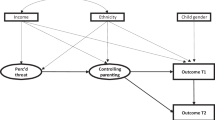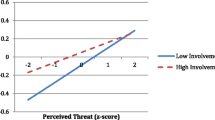Abstract
Maternal perceptions of threat in the environment were examined as concomitants of controlling (vs. autonomy supportive) parenting. Forty mothers and their third-grade children were videotaped while completing homework-like tasks together. Maternal controlling (vs. autonomy supportive) behavior was measured both attitudinally by questionnaire, and behaviorally by coding of the videotapes. Mothers reported on their perceptions of environmental threat (worry, instability, scarcity). Results indicated that perceptions of threat were positively associated with controlling behaviors exhibited during the tasks, and negatively associated with children's motivation. Further, the relation between perceived instability and children's motivation was mediated by controlling parenting. Controlling parenting is associated with parental perceptions of threat and is one pathway through which threat may be associated with children's achievement goals.
Similar content being viewed by others
References
Adorno, T. W., Frenkel-Brunswik, E., Levinson, D. J., & Sanford, R. N. (1950). The authoritarian personality. Oxford, England: Harpers.
Ames, C. (1992). Classrooms: Goals, structures, and student motivation. Journal of Educational Psychology, 84, 261–271.
Ames, C. (1984). Achievement attributions and self-instructions under competitive and individualistic goal structures. Journal of Educational Psychology, 76, 478–487.
Barber, B. K. (1996). Parental psychological control: Revisiting a neglected construct. Child Development, 67, 3296–3319.
Barkow, J. H., Cosmides, L., & Tooby, J. (1992). The adapted mind: Evolutionary psychology and the generation of culture. New York: Oxford University Press.
Baron, R. M., & Kenny, D. A. (1986). The moderator-mediator variable distinction in social psychological research: Conceptual, strategic, and statistical considerations. Journal of Personality and Social Psychology, 51, 1173–1182.
Baumeister, R. F., Heatherton, T. F., & Tice, D. M. (1993). When ego threats lead to self-regulation failure: Negative consequences of high self-esteem. Journal of Personality and Social Psychology, 64, 141–156.
Baumrind, D. (1967). Child care practices anteceding three patterns of preschool behavior. Genetic Psychology Monographs, 75, 43–88
Baumrind, D. (1989). Rearing competent children. In W. Damon (Ed.), Child development today and tomorrow (pp. 349–378), San Francisco, CA: Jossey-Bass/Pfeiffer.
Brophy, J. (1986). Teacher influences on student achievement. American Psychologist Special Issue: Psychological Science and Education, 41, 1069–1077.
Conger, R. D., Patterson, G. R., & Ge, X. (1995). It takes two to replicate: A mediational model for the impact of parents' stress on adolescent adjustment. Child Development, 66, 80–97.
Deci, E. L., & Ryan, R. M. (1985). Intrinsic motivation and self-determination in human behavior. New York: Plenum.
Dodge, K. A., Pettit, G. S., & Bates, J. E. (1994). Socialization mediators of the relation between socioeconomic status and child conduct problems. Child Development Special Issue: Children and Poverty, 65, 649–665.
Dornbusch, S. M., Ritter, P. L., Leiderman, P. H., Roberts, D. F., & Fraleigh, M. J. (1987). The relation of parenting style to adolescent school performance. Child Development Special Issue: Schools and Development, 58, 1244–1257.
Doty, R. M., Peterson, B. E., & Winter, D. G. (1991). Threat and authoritarianism in the United States, 1978–1987. Journal of Personality and Social Psychology, 61, 629–640.
Dweck, C. S., & Leggett, E. L. (1988). A social-cognitive approach to motivation and personality. Psychological Review, 95, 256–273.
Dweck, C. S. (1986). Motivational processes affecting learning. American Psychologist Special Issue: Psychological science and education, 41, 1040–1048.
Elliott, E. S., & Dweck, C. S. (1988). Goals: An approach to motivation and achievement. Journal of Personality and Social Psychology, 54, 5–12.
Entwisle, D. R., & Hayduk, L. A. (1988). Lasting effects of elementary school. Sociology of Education, 61, 147–159.
Feldman, S., & Stenner, K. (1997). Perceived threat and authoritarianism. Political Psychology, 18, 741–770.
Garner, R. (1990). When children and adults do not use learning strategies: Toward a theory of settings. Review of Educational Research Special Issue: Toward a unified approach to learning as a multisource phenomenon, 60, 517–529.
Geary, D. C., & Flinn, M. V. (2001). Evolution of human parental behavior and the human family. Parenting: Science and Practice, 1, 5–61.
Ginsburg, G. S., & Bronstein, P. (1993). Family factors related to children's intrinsic/extrinsic motivational orientation and academic performance. Child Development, 64, 1461–1474.
Gray, M. R., & Steinberg, L. (1999). Unpacking authoritative parenting: Reassessing a multidimensional construct. Journal of Marriage and the Family, 61, 574–587.
Grolnick, W. S. (2003). The psychology of parental control: How well-meant parenting backfires. Mahwah, NJ: Erlbaum.
Grolnick, W. S., Benjet, C., Kurowski, C., & Apostoleris, N. (1997). Predictors of parent involvement in children's schooling. Journal of Educational Psychology, 89, 1–11.
Grolnick, W. S., Gurland, S. G., DeCourcey, W., & Jacob, K. (2002). Antecedents and consequences of mothers' autonomy support: An experimental investigation. Developmental Psychology, 38, 143–155.
Grolnick, W. S., & Ryan, R. M. (1989). Parent styles associated with children's self-regulation and competence in school. Journal of Educational Psychology, 81, 143–154.
Grolnick, W. S., Ryan, R. M., & Deci, E. L. (1991). Inner resources for school achievement: Motivational mediators of children's perceptions of their parents. Journal of Educational Psychology, 83, 508–517.
Grolnick, W. S., Weiss, L., McKenzie, L., & Wrightman, J. (1996). Contextual, cognitive, and adolescent factors associated with parenting in adolescence. Journal of Youth and Adolescence, 25, 33–54.
Kohn, M. (1977). Class and conformity: A study in values (2nd ed.). Chicago: University of Chicago Press.
Lovejoy, C. O. (1981). The origin of man. Science, 211, 341–350.
Luster, T., Rhoades, K., & Haas, B. (1989). The relation between parental values and parenting behavior: A test of the Kohn hypothesis. Journal of Marriage and the Family, 51, 139–147.
MacDermid, S. M., & Williams, M. L. (1997). A within-industry comparison of employed mothers' experiences in small and large workplaces. Journal of Family Issues, 18, 545–566.
McEwen, B. S., & Stellar, E. (1993). Stress and the individual: Mechanisms leading to disease. Archives of Internal Medicine, 153, 2093–2101.
McLoyd, V. C. (1989). Socialization and development in a changing economy: The effects of paternal job and income loss on children. American Psychologist, 44, 293–302.
Meece, J. L., & Holt, K. (1993). A pattern analysis of students' achievement goals. Journal of Educational Psychology, 85, 582–590.
Nesse, R. M. (2001). The smoke detector principle: Natural selection and the regulation of defensive responses. Annals of the New York Academy of Sciences, 935, 75–85.
Nesse, R. M. (2005). Maladaptation and natural selection. The Quarterly Review of Biology, 80, 62–71.
Pintrich, P. R. (2000). Multiple goals, multiple pathways: The role of goal orientation in learning and achievement. Journal of Educational Psychology, 92, 544–555.
Pintrich, P. R., & Garcia, T. (1991). Student goal orientation and self-regulation in the college classroom. In M. L. Maehr & P. R. Pintrich (Eds.), Advances in motivation and achievement: Goals and self-regulatory processes (Vol. 7, pp. 371–402). Greenwich, CT: JAI Press.
Pomerantz, E. M., & Eaton, M. M. (2001). Maternal intrusive support in the academic context: Transactional socialization processes. Developmental Psychology, 37, 174–186.
Ryan, R. M., & Grolnick, W. S. (1986). Origins and pawns in the classroom: Self-report and projective assessments of individual differences in children's perceptions. Journal of Personality and Social Psychology, 50, 550–558.
Sales, S. M. (1972). Economic threat as a determinant of conversion rates in authoritarian and nonauthoritarian churches. Journal of Personality and Social Psychology, 23, 420–428.
Schaefer, E. S. (1965). Children's reports of parental behavior: An inventory. Child Development, 36, 413–424.
Schaefer, E. S., & Edgerton, M. (1985). Parent and child correlates of parental modernity. In I. E. Sigel (ed.), Parental belief systems: The psychological consequences for children (pp. 287–318). Hillsdale, NJ: Erlbaum.
Schwarz, J. C., Barton-Henry, M. L., & Pruzinsky, T. (1985). Assessing child-rearing behaviors: A comparison of ratings made by mother, father, child and sibling on the CRPBI. Child Development Special Issue: Family Development, 56, 462–479.
Shrout, P. E., & Bolger, N. (2002). Mediation in experimental and nonexperimental studies: New procedures and recommendations. Psychological Methods, 7, 422–445.
Sobel, M. E. (1982). Asymptotic confidence intervals for indirect effects in structural equation models. In S. Leinhardt (Ed.), Sociological methodology (pp. 290–312). San Francisco: Jossey Bass.
Sobel, M. E. (1986). Some new results on indirect effects and their standard errors in covariance structure models. In N. Tuma (Ed.), Sociological methodology (pp. 159–186). Washington, DC: American Sociological Association.
Trivers, R. L. (1974). Parent-offspring conflict. American Zoologist, 14, 249–264.
Wentzel, K. R. (2002). Are effective teachers like good parents? Teaching styles and student adjustment in early adolescence. Child Development, 73, 287–301.
Xu, J., & Corno, L. (1998). Case studies of families doing third grade homework. Teachers College Record, 100, 402–436.
Zussman, J. U. (1980). Situational determinants of parental behavior: Effects of competing cognitive activity. Child Development, 51, 792–800.
Author information
Authors and Affiliations
Corresponding author
Rights and permissions
About this article
Cite this article
Gurland, S.T., Grolnick, W.S. Perceived Threat, Controlling Parenting, and Children's Achievement Orientations. Motiv Emot 29, 103–121 (2005). https://doi.org/10.1007/s11031-005-7956-2
Issue Date:
DOI: https://doi.org/10.1007/s11031-005-7956-2




